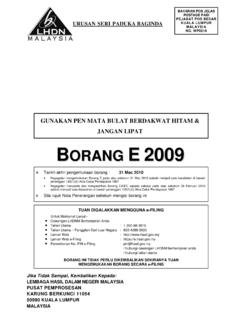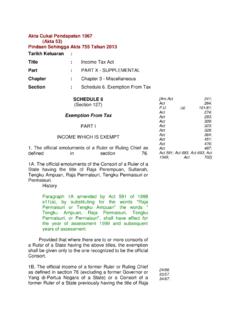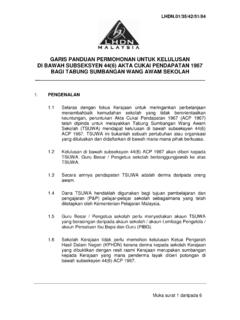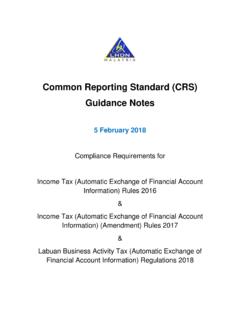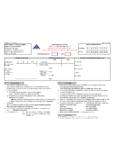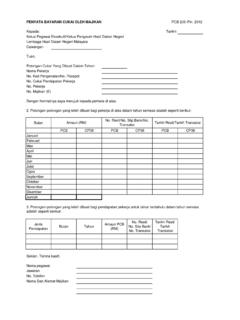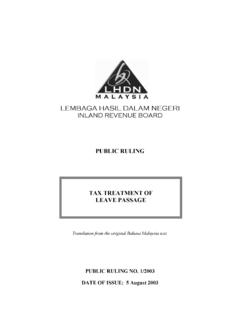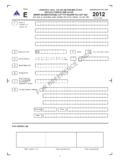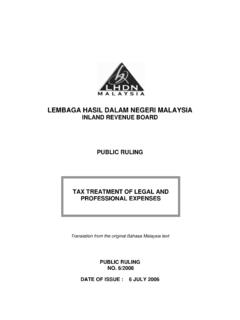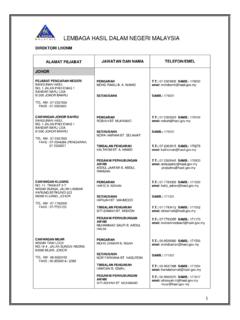Transcription of LIST OF APPENDICES APPENDIX 2 - Hasil
1 LIST OF APPENDICES APPENDIX 1 : Extension of Tax Incentives For New 4 & 5 Star Hotels APPENDIX 2 : Tax Incentive For Implementation of Minimum Wages APPENDIX 3 : Monthly Tax Deduction As Final Tax APPENDIX 4 : Tax Incentive For Flexible Work Arrangements APPENDIX 5 : Tax Incentive For Anchor Companies Under Vendor Development Programme APPENDIX 6 : Review of Real Property Gains Tax APPENDIX 7 : Relief For Middle Income Tax Payers APPENDIX 8 : Extension of Accelerated Capital Allowance on Information Technology and Communication Equipment APPENDIX 9 : Goods And Services Tax Model APPENDIX 1 0 : Review of Individual Income Tax APPENDIX 1 1 : Review of Corporate Income Tax APPENDIX 12 : Review of Co-Operative Income Tax APPENDIX 13 : Tax Incentive Package In Line With GST Implementation 1 APPENDIX 1 EXTENSION OF TAX INCENTIVES FOR NEW 4 & 5 STAR HOTELS Current Position Hotel operators undertaking new investments in 4 & 5 star hotels are given the following tax incentives: A.
2 Peninsular Malaysia: i. Pioneer Status Exemption of 70% of statutory income for a period of 5 years; OR ii. Investment Tax Allowance Allowance of 60% on the qualifying capital expenditure incurred within a period of 5 years. This allowance can be set-off against 70% of statutory income for each year of assessment. The above incentives are for applications received by Malaysian Investment Development Authority (MIDA) from 8 October 2011 until 31 December 2013. B. Sabah and Sarawak: i. Pioneer Status Exemption of 100% of statutory income for a period of 5 years; OR ii. Investment Tax Allowance Allowance of 100% on the qualifying capital expenditure incurred within a period of 5 years.
3 This allowance can be set-off against 100% of statutory income for each year of assessment. The above incentives are for applications received by Malaysian Investment Development Authority (MIDA) from 30 August 2008 until 31 December 2013. 2 Proposal In conjunction with the Visit Malaysia Year 2014 and to provide adequate international standard accommodation especially to cater for luxury and high spending tourists as well as to increase the facilities for meeting, incentive, convention and exhibition (MICE) activities, it is proposed that Pioneer Status or Investment Tax Allowance for new investments in 4 & 5 star hotels in Peninsular Malaysia, Sabah and Sarawak be extended. Effective Date Applications received by Malaysian Investment Development Authority (MIDA) from 1 January 2014 to 31 December 2016.
4 3 APPENDIX 2 TAX INCENTIVE FOR IMPLEMENTATION OF MINIMUM WAGES Current Position The minimum wages policy requires employers to pay their employees a minimum wages of RM900 per month in Peninsular Malaysia and RM800 in Sabah, Sarawak and Labuan. Under the minimum wages policy, all enterprises including professional firms are required to pay a minimum wages to local and foreign employees, except those classified as domestic workers. Wages paid by employers to their employees are eligible for deduction for the purpose of income tax computation. Proposal To ensure the smooth implementation of the minimum wages policy, it is proposed that the difference between the original salary and the minimum wages paid by SMEs, cooperatives, associations and organizations employers be given further deduction.
5 Effective Date The incentive is given for a period of one year from 1 January 2014 to 31 December 2014. 4 APPENDIX 3 MONTHLY TAX DEDUCTION AS FINAL TAX Current Position Monthly Tax Deduction (MTD) is a mechanism to deduct monthly tax payments on employment income received by employees in the current year. Employers are responsible to remit MTD to Inland Revenue Board (IRB) every month as provided under the Income Tax (Deduction from Remuneration) Rules 1994. Employers are required to make MTD payments after deducting personal relief, relief for spouse with no income, child relief and zakat payment through employee salary deductions. In addition, employees may request their employers to deduct other reliefs such as contribution to the Employee Provident Fund so that the MTD payments are equal to the total final tax payable.
6 Employees for whom income tax has been deducted through the MTD are required to submit tax returns to IRB on or before 30th April in the following year. The submission of tax returns burdens the employees with the need to re-compute income tax which may be equivalent to the MTD made by the employer. Proposal To facilitate employees whose total income tax is equivalent to the amount of MTD, it is proposed that such tax payers no longer need to submit tax returns. This would render that the amount of MTD is the final tax paid. The proposal is only applicable to: i. employees who receive employment income prescribed under section 13 of the Income Tax Act 1967; ii. employees whose MTD are made under the Income Tax (Deduction from Remuneration) Rules 1994; and 5 iii.
7 Employees serving under the same employer for a period of 12 months in a calendar year. Effective Date From year of assessment 2014. 6 APPENDIX 4 TAX INCENTIVE FOR FLEXIBLE WORK ARRANGEMENTS Current Position A flexible and accommodative working environment is among the key factors to retain talent in the labour market. Career development and work-life balance requires employer to implement flexible work arrangements (FWA). FWA can be implemented by the employers as follows: i. flexible working hours - employees can opt and arrange the number of hours to work in a day as long as they fulfill the prescribed period of working hours in a week; ii. telecommuting - employees can work from home or from any location other than the office; iii. compressed work week - employees are allowed to shorten the number of working days in a week by working longer hours in a day; iv.
8 School holidays work arrangements - employees who have school going children are allowed to work from home during school holidays; and v. employees choice of days off - employees are given the option to plan their work schedule and off-days. FWA not only facilitates employers to align activities of the organisation with the increasingly complex work environment including virtual work, but also helps to boost the motivation and increase the productivity of employees. 7 Proposal To encourage companies to adopt and implement FWA as a best practice in human resource management, it is proposed that the expenses incurred in the training of employees, supervisors and managers as well as consultancy fees to design an appropriate FWA to be implemented by the employer be given further deduction.
9 The eligible expenses include costs for training in: i. optimizing a work- life balance; ii. technology orientation; iii. managing a flexible workforce; and iv. helping managers embrace flexible work alternatives. The incentive is given for a period of 3 years of assessment and subject to the companies obtaining FWA status from Talent Corporation Malaysia Berhad. Effective Date For FWA status application received by Talent Corporation Malaysia Berhad from 1 January 2014 to 31 December 2016. 8 APPENDIX 5 TAX INCENTIVE FOR ANCHOR COMPANIES UNDER VENDOR DEVELOPMENT PROGRAMME Current Position Vendor Development Programme (VDP) has been introduced with the objective of creating vendors that are competitive and of world standards. In addition, VDP also aims to strengthen existing vendors and encourage creation of new vendors among Small and Medium Enterprises (SMEs).
10 VDP targets government-linked companies and multinational companies as anchors whereas local companies and SMEs as vendors. Among anchor companies that have implemented VDP are PETRONAS, PROTON, Tenaga Nasional Berhad, Telekom Malaysia Berhad, MAS and Boustead Naval Shipyard Sdn. Bhd. A structured and comprehensive VDP requires anchor companies to incur high operating and development expenses. Such expenses do not qualify for deduction. Proposal The Bumiputera Economic Empowerment Agenda focuses among others to intensify Bumiputera entrepreneurship and businesses. Under this focus area, the Government urges the public and private sectors to continuously strengthen and propel VDP so that Bumiputera entrepreneurs become more competitive.
